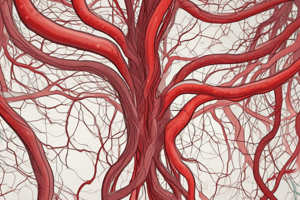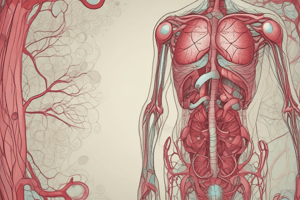Podcast
Questions and Answers
What is the function of arteries in the circulatory system?
What is the function of arteries in the circulatory system?
- Carry oxygen to the rest of the body
- Move blood away from the heart (correct)
- Form blood clots when a blood vessel is cut
- Bring blood back to the heart
Which component of blood carries oxygen to the rest of the body?
Which component of blood carries oxygen to the rest of the body?
- Red Blood Cells (correct)
- Plasma
- White Blood Cells
- Platelets
Where does the right atrium of the heart collect blood from?
Where does the right atrium of the heart collect blood from?
- Veins (correct)
- Lungs
- Rest of the body
- Arteries
What is the main function of white blood cells in the circulatory system?
What is the main function of white blood cells in the circulatory system?
Which component of blood carries nutrients, water, chemicals, and wastes?
Which component of blood carries nutrients, water, chemicals, and wastes?
What happens in the right ventricle of the heart?
What happens in the right ventricle of the heart?
Which system does the circulatory system work with to exchange gases in the human body?
Which system does the circulatory system work with to exchange gases in the human body?
What type of blood do the pulmonary veins carry?
What type of blood do the pulmonary veins carry?
Why are the pulmonary arteries considered arteries even though they do not carry oxygen-rich blood?
Why are the pulmonary arteries considered arteries even though they do not carry oxygen-rich blood?
What role does heredity play in the development of non-communicable diseases?
What role does heredity play in the development of non-communicable diseases?
What is hypertension characterized by?
What is hypertension characterized by?
What term is used to describe the force exerted by the blood against artery walls?
What term is used to describe the force exerted by the blood against artery walls?
Which side of the heart works harder according to the text?
Which side of the heart works harder according to the text?
What is the main blood supplier to the body?
What is the main blood supplier to the body?
What is the function of veins in the circulatory system?
What is the function of veins in the circulatory system?
Where does blood go after leaving the left ventricle?
Where does blood go after leaving the left ventricle?
What are the coronary blood vessels that branch off from the aorta responsible for?
What are the coronary blood vessels that branch off from the aorta responsible for?
Which part of the circulatory system prevents blood from flowing backward?
Which part of the circulatory system prevents blood from flowing backward?
What is hypertension characterized by?
What is hypertension characterized by?
Which condition is known as the 'Silent Killer'?
Which condition is known as the 'Silent Killer'?
What is a common cause of atherosclerosis?
What is a common cause of atherosclerosis?
Which term describes the gradual loss of elasticity in the arteries?
Which term describes the gradual loss of elasticity in the arteries?
What condition is characterized by a weakened arterial wall that may rupture?
What condition is characterized by a weakened arterial wall that may rupture?
What is a common consequence of a stroke?
What is a common consequence of a stroke?
What is a condition characterized by the thickening and hardening of the walls of the arteries?
What is a condition characterized by the thickening and hardening of the walls of the arteries?
Which term refers to a sudden loss of brain function due to a disturbance in the blood vessels supplying the brain?
Which term refers to a sudden loss of brain function due to a disturbance in the blood vessels supplying the brain?
What is a potentially life-threatening condition characterized by a ballooning and weakening of an artery wall?
What is a potentially life-threatening condition characterized by a ballooning and weakening of an artery wall?
What is the main cause of atherosclerosis?
What is the main cause of atherosclerosis?
Which term refers to a chronic condition of high blood pressure that can lead to various cardiovascular complications?
Which term refers to a chronic condition of high blood pressure that can lead to various cardiovascular complications?
What is the term for the build-up of fats, cholesterol, and other substances in and on the artery walls?
What is the term for the build-up of fats, cholesterol, and other substances in and on the artery walls?
Which condition is characterized by the hardening and thickening of artery walls?
Which condition is characterized by the hardening and thickening of artery walls?
What is a common underlying factor for both aneurysms and hypertension?
What is a common underlying factor for both aneurysms and hypertension?
Which condition involves the loss of elasticity in the arterial walls, contributing to increased blood pressure?
Which condition involves the loss of elasticity in the arterial walls, contributing to increased blood pressure?
Which of the following is a contributing factor to the development of a stroke?
Which of the following is a contributing factor to the development of a stroke?
Which type of cholesterol contributes to the increase in plaque on artery walls?
Which type of cholesterol contributes to the increase in plaque on artery walls?
What distinguishes an aneurysm from arteriosclerosis?
What distinguishes an aneurysm from arteriosclerosis?




